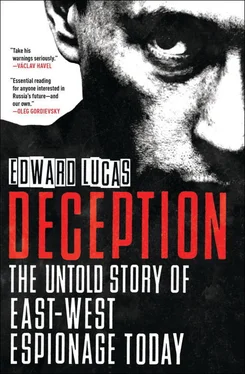The international media frenzy surrounding Ms Chapman trivialised espionage as a branch of show business. The mistake was easily made: pouting and haughty, the Russian firecracker could easily be a fictional character, not a real one. She would fit in neatly as the sultry sidekick to the arch-villain in a Bond movie – 007’s relationship with ‘90-60-90’ (Ms Chapman’s Russian nickname, which comes from her shapely figure) [4] d In inches she would be 35–24–35.
would provide appropriately cheesy sexual tension. The lurid and seemingly pointless affair invited ridicule. New York magazine’s headline was ‘Russian Spies Too Useless, Sexy to Prosecute’. In London, the Guardian said confidently that ‘none of the 10 Russians had culled any secrets from their hideouts in US suburbia’. A grand old man of Anglo-American journalism opined that the Russian illegals’ operation was marked by ‘complete futility’. 6As the detainees were swapped in Vienna for four people jailed in Russia for spying, David Cornwell, who under the pseudonym John le Carré so ably captured the dark intrigues of Cold War espionage, even suggested that out-of-control ‘rightists’ in America’s intelligence agencies were trying to jinx the improvement in Russian–American relations. He asked: ‘As we watch live in glorious Technicolor the greatest spy-swap of the twenty-first century, and hear in our memories the zither twanging out the Harry Lime theme, do the spies expect us to go scurrying back to our cold war shelters? Is that the cunning plan?’ 7
With respect to Britain’s greatest spy writer, and with rather less to other commentators, that is an oddly complacent approach. Spies need to seem as boring and inconspicuous as possible, to develop the capabilities that their real jobs require. If they are to be humble errand-runners, ferrying money, false documents and other wherewithal to more glamorous operatives, then they need jobs that allow them to travel. George Smiley, le Carré’s best-known character, spent the war years working undercover as an official (supposedly Swiss) of a Swedish shipping company – the perfect background for someone needing a regular excuse to visit Hamburg or other German ports. 8For some the task is to gain jobs, hobbies or lifestyles that give access to secret information. If the mission is identifying potential sources and the weaknesses that will enable their recruitment, they should be good networkers. If they are case officers, who recruit, direct, motivate and check the agents, they need a lifestyle in which meeting a wide range of people arouses no suspicion. If they are moles, aiming to penetrate the other side’s security or intelligence services, they need educational and career paths that will make them credible candidates for recruitment there.
Charles Crawford, a British diplomat in the region for many years, explains it well on his blog. 9Espionage means finding out where highly sensitive and useful information is stored or circulated, then using the human or physical weaknesses in its protection to copy the information in an undetectable way. All this must be done without anyone noticing or suspecting, and repeated many times over. In such work invisibility is a prime advantage. Spycatchers can watch the every waking and sleeping hour of a diplomat suspected of spying. They can comb through visa applications to spot foreign visitors who may be more or less than they seem. They can put suspects on their own side under surveillance to see if they are having odd meetings with strange people. Such techniques may be effective in catching a spook disguised as a diplomat, or a careless traitor. But they have almost no chance of catching a properly trained and targeted ‘illegal’ – someone working under an acquired or stolen identity.
As I show in chapter 6, such a person is an asset that can be used whenever, however and wherever it is needed. That Russia is running such agents in America, Britain and Europe (and elsewhere) should be cause for alarm. Imagine that someone who loathes you has a key to your front door. It will be little comfort if he has not yet got round to burning your house down, stealing your valuables, or planting drugs. The worry is that he could.
Russians do not trivialise or ridicule espionage. They take it rather seriously, both as a threat from abroad and as something that their country excels in. Admittedly, people everywhere find fictional spies glamorous. America has the amnesiac but indestructible Jason Bourne: 10Commander Bond’s high jinks sprinkle stardust over the reputation of SIS. But real-life spies in Western countries have only modest privileges compared to their counterparts elsewhere. In Britain, for example, they retire at 55, earlier than the diplomatic colleagues whose cover they use. They have rather larger and more loosely scrutinised expense accounts than other officials, but on the whole enjoy the same lifestyle as any other middle-class professional.
The Soviet legacy, however, has left a distinctive aura around espionage in Russia. For officers of the KGB (such as Ms Chapman’s father Vasily, or Mr Putin and hundreds of thousands like them) life was markedly nicer than for fellow inmates of the workers’ paradise. Housed in the KGB’s special accommodation, its officers had access to shops stocked with otherwise unavailable products. They holidayed at KGB resorts and were spared some of the system’s petty restrictions on daily life. Those in the elite foreign-espionage division, the First Chief Directorate, and some colleagues in cryptography and counter-intelligence, could even be sent to work abroad – perhaps even a posting to the fabled Western cornucopia that the class warriors both despised and envied.
Privileges aside, the KGB also enjoyed a mystique that still lingers over its successor organisations. People saw it (rather inaccurately) as efficient, knowledgeable and incorruptible. Its officers had a job that mattered, in an organisation that worked, and were well rewarded for it. Few in the claustrophobic, ill-run and bribe-plagued Soviet Union could boast as much. Like the space programme and sporting heroes, the KGB also touched another emotional chord: patriotism. Though its ultimate loyalty was to the Communist Party, not to the Soviet state (it described itself as the Party’s ‘sword and shield’), it basked in the reflected glory of the defeat of Nazi Germany. Rather as the Battle of Britain provides Britain’s ‘finest hour’, as the Resistance epitomises France’s national myth, and as the Normandy beaches exemplify America’s commitment to the freedom of Europe, the Great Patriotic War (as the Second World War is known in Russia) was the central plank in the Soviet Union’s self-image – and plays the same role in Russian identity today.
For all the heroism displayed by Soviet soldiers in defeating the Nazi invaders, the real role of the secret police in those years was a despicable mix of war crimes against the foe, ruthless pacification of ‘liberated’ territories and persecution of real or imagined waverers on its own side. 11Yet Soviet wartime history mostly comes across in a quite different light: on the television screens later adorned by Ms Chapman’s lightweight programme on unsolved mysteries, 12viewers used to watch the exploits of the best-known Soviet fictional spy, Max Otto von Stirlitz (to give him his German cover name). His wartime mission was to penetrate the Nazi high command. Unlike Bond, Stirlitz shuns gadgets, guns and girls. His weapon is his mind, fuelled not by communist ideology but a plangent patriotism. Though implausible, books and films featuring his exploits were compelling and sympathetic by the hackneyed standards of Soviet propaganda. 13They so captivated a tough teenager in the backstreets of 1970s Leningrad that he took the unusual step of walking into the city’s KGB headquarters and volunteering his services. But the young Vladimir Putin was told that the organisation did not accept walk-ins; he should get an education first and wait to be approached. [5] e Putin studied international law at Leningrad State University. He graduated in 1975 and joined the KGB immediately afterwards.
Читать дальше












